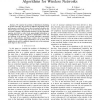275 search results - page 14 / 55 » Distributed interference compensation for wireless networks |
INFOCOM
2007
IEEE
14 years 1 months ago
2007
IEEE
— We consider the problem of distributed scheduling in wireless networks. We present two different algorithms whose performance is arbitrarily close to that of maximal schedules,...
TIT
2008
13 years 7 months ago
2008
We address the question of providing throughput guarantees through distributed scheduling, which has remained an open problem for some time. We consider a simple distributed sched...
INFOCOM
2007
IEEE
14 years 1 months ago
2007
IEEE
Abstract— The performance of scheduling schemes in multihop wireless networks has attracted significant attention in the recent literature. It is well known that optimal schedul...
CORR
2008
Springer
13 years 7 months ago
2008
Springer
In wireless channels, the path loss exponent (PLE) has a strong impact on the quality of the links, and hence, it needs to be accurately estimated for the efficient design and oper...
SIGMETRICS
2008
ACM
13 years 7 months ago
2008
ACM
Time synchronization is an essential service in distributed computing and control systems. It is used to enable tasks such as synchronized data sampling and accurate time-offlight...

